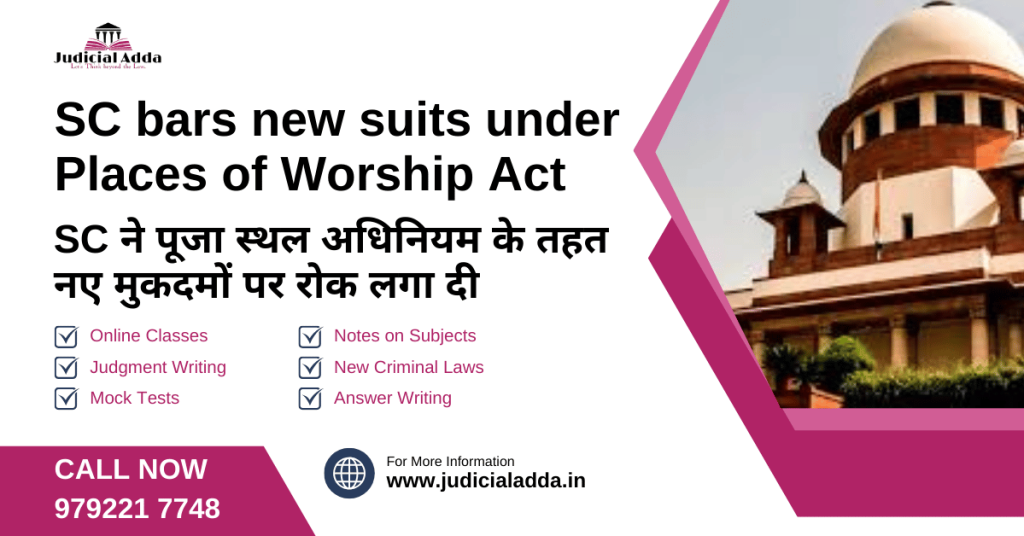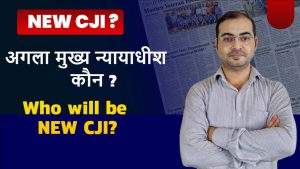
On Thursday, December 12, the Supreme Court ruled that until it issues additional orders, no more lawsuits under places of worship act may be filed nationwide.
The Court further mandated that courts refrain from issuing effective interim or final orders, including survey orders, in outstanding disputes (e.g., those involving Gyanvapi Mosque, Mathura Shahi Idgah, Sambhal Jama Masjid, etc.). While considering a number of petitions against the Places of Worship (Special Provisions) Act, 1991, the interim ruling was issued.
Concerns over the numerous lawsuits filed nationwide asserting ownership of medieval mosques and dargahs prompted the Court’s pivotal intervention. At least four people were killed in November when violence broke out in Sambhal, Uttar Pradesh, due to a survey order issued by a trial court against a mosque that dates back to the 16th century.
Bench in Matter
The following ruling was made by a special bench made up of Justices Sanjay Kumar, KV Viswanathan, and Chief Justice of India Sanjiv Khanna.
What Did the Court Say?
Since the case is still pending before this court, we think it is fair to rule that although lawsuits may be made, no registrations or actions will be taken until this court issues additional orders. Additionally, we mandate that the courts refrain from issuing any final or effective interim orders, including survey orders, in the ongoing cases until the following hearing date.
The Court did not, however, grant a stay of the current lawsuits against houses of worship, such as mosques and dargas. Additionally, within four weeks of today, the Court requested that the Union Government submit its counter-affidavit to the petitions challenging the Places of Worship Act. It has been instructed that a copy of the Center’s counter-affidavit be posted online for anyone to download.
Read more from here
| Sambhal Mosque Dispute- SC halts the Trial Proceeding | Uttarkashi Mosque Dispute |
Matters: The Court Showed Concerns Upon
The bench was told that there are already 18 lawsuits against 10 mosques and shrines pending nationwide. Justice Viswanathan informed Solicitor General Tushar Mehta at the hearing, “Mr. SG, your plea contests the Act’s constitutionality…there is a bigger question…one of the arguments you have to meet…According to one perspective, S.3 is only a powerful restatement of constitutional concepts that are already ingrained. The Supreme Court cannot be challenged by civil courts. For this reason, a stay is required. Five judges have rendered a decision for you.”
A number of petitions challenging the constitutionality of the 1991 Act, which forbids the change of places of worship from their original religious character as of August 15, 1947, were being heard by the Court.
In 2020, Ashwini Kumar Upadhyay v. Union of India was filed as the primary petition, and in March 2021, the Court sent notice to the Union Government. A small number of subsequent petitions contesting the Act were submitted in a similar manner.
Today’s listing also included a writ petition that Jamiat Ulema-i-Hind filed to get the Act implemented. Political groups such as the CPI(M), Indian Union Muslim League, DMK, RJD MP Manoj Kumar Jha, NCP (Sharad Pawar) MLA Jitendra Awhad, and others have submitted a number of intervention applications demanding the Act’s protection.
Despite multiple extensions granted by the Court, the Union Government has yet to submit its counter-affidavit in the case. The recent violent incidents that followed the survey of the Sambhal Jama Masjid in Uttar Pradesh made the Act a major topic of public concern.
Advocates Vishnu Shankar Jain, Ejaz Maqbool, and Kanu Agarwal were designated by the Court as nodal counsel to prepare compilations on behalf of the petitioners, the Union, and the parties in favor of the Act, respectively.
Case Title: Ashwini Kumar Upadhyay v. Union of India and Ors. WP(C) No. 1246/2020 and connected matters





